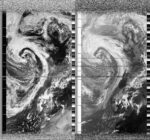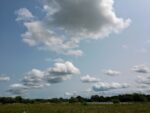2025-06-03 12:35:18
Richard Carter
University of York, Campus East, United Kingdom
United Kingdom
NOAA-18


I've been reflecting recently on how my relationship with the atmosphere has changed since becoming a glider pilot. Different patterns and shapes of cloud are now read as resources for staying aloft, even on the ground. The photograph alongside this entry neatly illustrates a promising 'gliding sky' - large clouds with dark, flat undersides, and fluffy tops: all of which indicate potential for lift below. In particular, the clouds are forming a noticeable 'line of energy', that can be followed like a road, hopping from one source of lift to another. However, the one key aspect not captured here is the wind, which today would put paid to any flying - guests up to 32kts, which would exceed the safe takeoff and landing limits of any glider. Even if the wind was slightly lower, the strong drift would present a challenge for local soaring - hard to stay the course. Finally, there are sharp scuds of rain, which is always unwelcome, especially when airborne.
Today's NOAA imagery showcases the source of all this atmospheric energy very well, and I am very pleased to be on the ground!